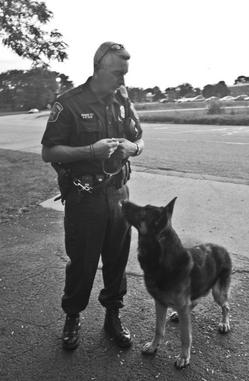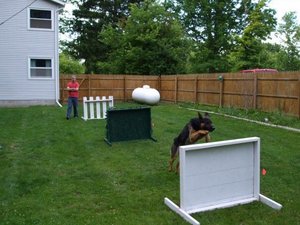A look inside the life of an Ann Arbor Police Department dog, part 2: These K9s may work longer hours than you do

Officer Maguire and Lenny on the job
Photo courtesy of Patrick Maguire
We recently posted the first half of "A look inside the life of an Ann Arbor Police Department dog: Shepherds are a popular choice." This was part of our ongoing Working Animals series, called "More than man's best friend."
As mentioned previously, the Ann Arbor Animal Hospital provides emergency care, preventative health and other general health concerns for police dogs at the Ann Arbor Police Department. Officer Maguire provided us with a lot of information and insight into the life of his working dog and partner, Lenny. Without further ado, here's the second half, and we hope you enjoy it as much as we did.
Where do the dogs stay when they aren't working?
When Lenny is not working, he goes home with me. His police car has been specially outfitted with a dog kennel in the rear seat area. Since the car is made just for him, we take the car home with us. Not only does this make it easier to get him to and from work, but it allows us to expedite our response if we are called in "off duty."
When at home, Lenny goes from being a big loud-mouth police dog to a very quiet and lazy family member who enjoys falling asleep on the couch and following my young son around the house.
So what's a day off like for your dog? Where does he stay and what do they do when they're able to leave "work"?
On days off Lenny generally is left to do what he wants around the house. He is sometimes crated, but now spends much of his free time lounging around the basement or on the living room couch. He gets walked most every day and likes to play in the yard with our St. Bernard.
Occasionally, we work in some quick obedience or practice our skills by trying to track family members in a park. Generally, I like to let Lenny use his days off to rest up and relax. However, I have noticed after a few days of not going to work, he starts to get anxious and restless. He really seems to love his job.
Do the dogs have different handlers or are they assigned to one, specific person?
While it is possible to have different people handle the same dog, the AAPD (and most police departments) assigns each dog to a specific handler. This allows the handler and dog to reinforce the special bond.
How many hours per week does a dog work?
Lenny works at least 40 hours per week. Special time is set aside almost every week for training. That is when we get together with other K9 teams from the area and work on detection work, tracking and other areas. The rest of that time, Lenny is in the car and on patrol.
How do you determine if a dog is successful and do you track "success statistics"?
Unfortunately, it is not always easy to know if a dog was "right" or not when tracking or looking for drugs. Sometimes there are conditions or situations which make it so that we don't know if our dog was correct or not.
These can include a suspect who flees an area on foot, but gets picked up in a car, or a vehicle which had drugs hidden in the trunk yesterday, but had them removed this morning (the trunk still smells like drugs to the dog, but there are none there), and so on.
The best way to get an idea of whether your dog is right or not is to practice hard and practice regularly and compare your dog's real-world actions to those he displays in training. We do keep extensive logs and records of our training, how and when we are deployed and what the outcome is of these deployments. Sometimes we are also able to get some follow-up feedback down the road from other investigators or suspects which tells us how successful our dogs were.
What is a dog's length of service?
This can vary by breed, the type of work, the dog's personal health, etc. However the dogs don't typically work much past 9 or 10.

Lenny enjoys some practice jumps at home
Photo courtesy of Patrick Maguire
Lenny is 8 years old now. While he gets mad when he hears me say it, he will likely retire sometime with then the next year to year and a half. Once retired, AAPD police dogs are usually transferred to their handler, who gets to keep them in the retirement years. I can foresee that Lenny will have to be kept somewhat active and still play some obedience or practice tracking games to keep him active as he hates not working.
What funny stories can you share with us about your working dog?
Lenny's first language was Czech, and when I went to pick him up (a few weeks after we looked at him and decided he would be our new K9), I knew nothing about handling a police dog. I was given a dog on a leash and told "good luck" by the guy who imported him.
I asked what language he was trained in, and the guy started spitting out a bunch of different commands in various languages (German, Dutch, etc.). After a few seconds, Lenny sat down and laid down. The guy looked at me and said, "Looks like he speaks Czech."
When I got Lenny home, I Googled "Czech dog commands" and tried to get Lenny to sit, lie down, stay, etc. Instead, I was able to get him to cock his head and look at me like I was crazy. After Lenny convinced me that my Czech was no good, we decided he would learn to listen to me in English.
Are there volunteer opportunities or events people can take advantage of who want to get involved with these particular types of working animals?
This question is a tough one. Off the top of my head I cannot think of anything. But I would love to thank the murses at St. Joseph Mercy Hospital who held fundraisers a few years back and raised enough money to buy a bullet-proof vest for Lenny.
For competitive working animals, as opposed to those who have a working vocation, are there beginner or novice events?
Yes, many people like to get involved in Schutzhund. This is a competitive and recreational sport where people train their dogs in different aspects of apprehension, tracking, obedience and so on. Many of the activities done in the sport of Schtuzhund are similar or based on those done by police or military dogs. There are many Schutzhund clubs out there which welcome new or novice dog handlers who want to explore the hobby.
What else would you like readers to know?
I have really enjoyed the opportunity to work with Lenny and be a part of the K9 Unit. Lenny gets absolutely spoiled as he gets his own customized car, eats great, gets to ride around in the car barking at people all day, gets top-notch medical care from Ann Arbor Animal Hospital, and so on but he really deserves it.
What makes Lenny happiest is going to work. He has shown me a true sense of dedication and loyalty and it really is fun to see just how smart and hard working animals can be when given the opportunity.
That's the end of this edition of "More than man's best friend." Once again, many thanks to Officer Maguire and the Ann Arbor Police Department, and we hope our readers enjoyed reading it.
David Caddell is the hospital director of the Ann Arbor Animal Hospital, a locally owned and operated Companion Animal Hospital. David can be reached at 734-662-4474 or dcaddell@AnnArborAnimalHospital.com.

